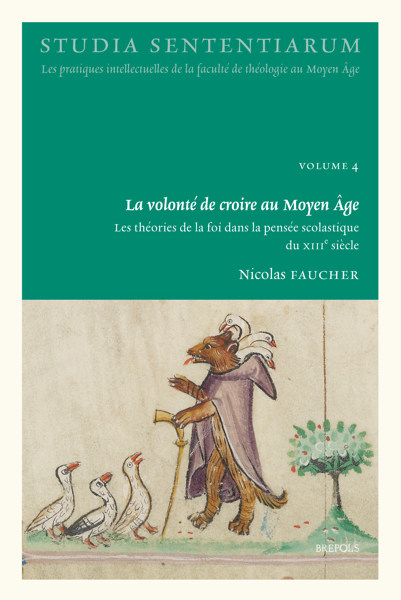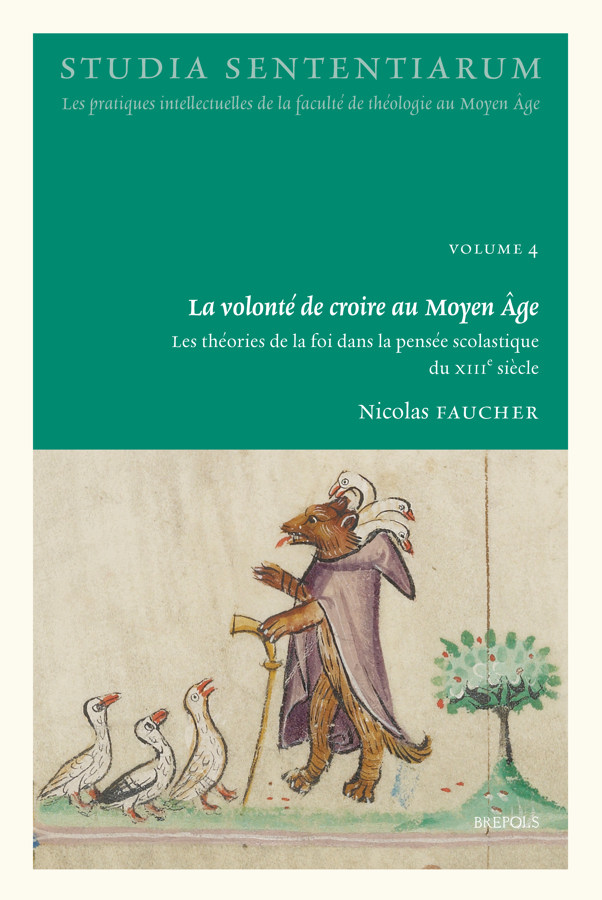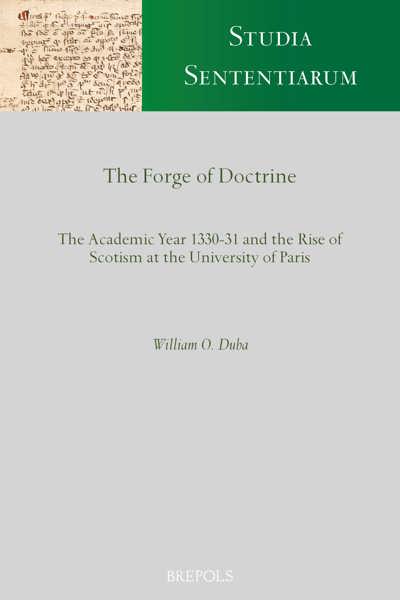
La volonté de croire au Moyen Âge
Les théories de la foi dans la pensée scolastique du XIIIe siècle
Nicolas Faucher
- Pages: xviii + 412 p.
- Size:156 x 234 mm
- Language(s):French
- Publication Year:2019
- € 95,00 EXCL. VAT RETAIL PRICE
- ISBN: 978-2-503-58701-1
- Hardback
- Available
- € 95,00 EXCL. VAT RETAIL PRICE
- ISBN: 978-2-503-58702-8
- E-book
- Available
This book is the first in-depth, diachronic philosophical study of some of the most important thirteenth-century theories of faith, including those of Alexander of Hales, Bonaventure, Aquinas, Peter John Olivi, Henry of Ghent, Godfrey of Fontaines and John Duns Scotus.
« Nicolas Faucher propose une étude novatrice et méritante, nourrie d’interrogations contemporaines, sur un sujet fort complexe. » (Jean-Marc Goglin, La Cliothèque, février 2020)
"Medieval discussions of faith might not, on their face, look like the most fertile territory for fresh topics of philosophical reflection, but Nicolas Faucher proves in this volume just how much we still have to learn from this material. [...] Combining an encyclopedic knowledge of the texts with an understanding of the current debate in analytic philosophy, he shows how diverse and resourceful medieval discussions of this topic were." (R. Pasnau, Oxford Studies in Medieval Philosophy, 8; 2020, p. 278-279)
"What makes Faucher’s subtle and detailed study so fascinating is the rich variety of theories he documents. […] Faucher does an excellent job in analyzing and explaining them on a solid textual basis, and he pays attention to sources (e.g., texts by Alexander of Hales and Godfrey of Fontaines) that are often neglected. […] Faucher’s rich and well-documented study gives rise to fundamental questions. It shows that medieval accounts of the structure and justification of religious beliefs deserve close analysis. This original book will be indispensable reading for every philosopher interested in the ethics of belief." (D. Perler, dans Recherches de Théologie et Philosophie Médiévales, 87/2, 2020, p. 471-475)
« Ce grand travail, qui interroge les différents moyens d’accès humain à une vérité indiscutable en matière de foi, offre aussi de belles perspectives de réflexion, depuis le Moyen Âge, pour notre contexte moderne, sur la place des religions, niée ou exacerbée, et la valeur de leurs croyances. » (Alice Lamy, dans Le Moyen Âge, 2, 2021, p. 468-469)
"This excellent book provides a novel analysis of medieval theories of faith, using as its conceptual basis the notion of doxastic voluntarism: the thought that belief is in some sense in our power to choose. This notion fits very neatly with medieval accounts, since, other than in cases in which the intellect’s assent is compelled (for example, by necessary truths), the medieval philosophers all maintained that assent to a given proposition— paradigmatically the supernatural claims of Catholic Christianity, the principal interest of tthe earliest thinkers in Nicolas Faucher’s account—was in some sense voluntary. Indeed, one thing that the book illustrates very nicely is the way in which problems that begin in the early thirteenth century as fundamentally theological in nature become progressively more general and philosophical in character by the beginning of the fourteenth.[...] there are various issues closely related to the topic of Faucher’s study that would repay further study in light of his conclusions [...]. Still, that this book might (and I hope will) inspire further study is a mark of its quality rather than the opposite." (R. Cross, in Journal of the History of Philosophy 60/2, pp. 338-340)
"The monograph, which references the most cutting-edge scholarship, is an impressive, noteworthy, and important contribution to the study of medieval philosophy in general and to the highly complex discussion of the thirteenth century at the University of Paris in particular. With commendable clarity, Faucher articulates the intricate issues of epistemology, the psychology of cognition, and the interaction between intellect andwill, all set within the complex discussion of nature and grace. [...] The discourse that Faucher explores and so ably reconstructs is one that unquestionably reaches a point of profound and even paradigmatic articulation among the authors discussed [...]. Would that contemporary theology might return to the theory of faith and regain some of the perspicuity and depth of its thirteenth-century ancestry. Faucher’s excellent monograph is an opportune starting point for such a recovery of what is in its fullness nothing less than a theology of faith." R. Hütter, in Speculum 97/3, pp. 828-829)
“This excellent book provides a novel analysis of medieval theories of faith, using as its conceptual basis the notion of doxastic voluntarism: the thought that belief is in some sense in our power to choose.” (Richard Cross, in The Journal of the History of Philosophy, 60/2, 2022, p. 338-39)
« Le livre, indéniablement, se situe au cœur d’une tendance éditoriale actuelle concernant un sujet central, the Ethics of Belief. En ce sens, elle apporte une contribution décisive par ses conclusions autour du désenchantement à la manière gauchétienne de la philosophie du croire. » (Bénédicte Sère, dans Cahiers de civilisation médiévale n°262, April-June 2023, p. 198)
Nicolas Faucher est chercheur au Centre of Excellence in Reason and Religious Recognition de l'Académie de Finlande. Il est l'auteur et l'éditeur de plusieurs livres et articles scientifiques portant sur l'histoire de la philosophie médiévale, avec un intérêt particulier pour la philosophie de la religion, l'épistémologie et la philosophie de l'esprit.
Par quels mécanismes notre volonté, nos désirs, nos affects, influencent-ils nos croyances ? Sommes-nous libres de croire ce que nous voulons, même ce dont nous n'avons aucune preuve ? Et si nous le sommes, comment garantir que nous ne croyions pas au hasard, au gré de notre fantaisie ? Y a-t-il des raisons morales objectives de croire ce que nous ne pouvons savoir ? Le présent ouvrage a pour ambition de trouver réponse à ces questions dans les oeuvres académiques, notamment les commentaires des Sentences, de certains des penseurs les plus importants de l'âge d'or de la scolastique médiévale : Alexandre de Halès, Bonaventure, Thomas d'Aquin, Henri de Gand, Godefroid de Fontaines, Pierre de Jean Olivi et Jean Duns Scot. Si les questions posées ne sont pas toujours celles que les médiévaux ont affrontées, leur traitement de la notion de foi et des problèmes philosophiques et théologiques qui lui sont associés leur donne l'occasion d'y apporter des éléments de réponse significatifs pour l'histoire de la pensée occidentale. C'est à la mise au jour de ces éléments que ce livre est consacré. Il démontre l'existence de deux grands mouvements de pensée qui convergent vers un volontarisme doxastique de plus en plus marqué, accompagné d'un retrait croissant des ressorts surnaturels dans l'explication des croyances humaines.
Ce livre a été distingué par la mention honorable du Prix international Thomas Ricklin. Il constitue une version enrichie et approfondie de la thèse de doctorat de l'auteur, qui a été récompensée par le prix solennel Aguirre-Basualdo de la Chancellerie des Universités de Paris.
Chapitre introductif
Première partie: L’extension du rôle de la volonté dans la production des croyances ordinaires et la mise en place des fondements naturels de la croyance volontaire. La foi chez Alexandre de Halès, Bonaventure, Thomas d’Aquin et Pierre de Jean Olivi
Chapitre 1: Alexandre de Halès et Bonaventure
Chapitre 2: Thomas d’Aquin
Chapitre 3: Pierre de Jean Olivi
Deuxième partie: La réduction de la place du surnaturel comme fondement de la foi et l’affirmation par défaut du rôle de la volonté dans sa production. La foi chez Henri de Gand, Godefroid de Fontaines et Jean Duns Scot
Chapitre 4: Henri de Gand
Chapitre 5: Godefroid de Fontaines
Chapitre 6: Jean Duns Scot
Conclusion générale




